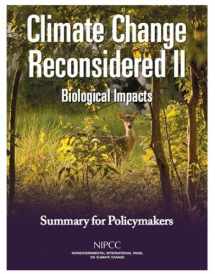
Climate Change Reconsidered II: Biological Impacts
Book details
Summary
Description
Climate Change Reconsidered II: Biological Impacts (CCR-IIb) is produced by the Nongovernmental International Panel on Climate Change (NIPCC). It is the second of three volumes in the Climate Change Reconsidered II series.
The first volume, Climate Change Reconsidered II: Physical Science (CCR-IIa) was published in September 2013. It examined the theory, models, and evidence regarding the science of climate change and concluded the human impact on global climate is small and any warming that may occur as a result of human carbon dioxide (CO2) and other greenhouse gas emissions is likely to have little effect on global temperatures, the cryosphere (ice-covered areas), hydrosphere (oceans, lakes, and rivers), or weather.
The current volume focuses on scientific research on the impacts of rising temperatures and atmospheric CO2 levels on the biological world. It finds no net harm to the global environment or to human health and often finds the opposite: net benefits to plants, including important food crops, and to animals and human health.
The research summarized in CCR-IIb refutes apocalyptic forecasts of the United Nations' Intergovernmental Panel on Climate Change (IPCC). A careful reading of the chapters reveals thousands of peer-reviewed scientific journal articles do not support and often contradict IPCC's alarmist narrative. Whether the subject is the likely effects of warming on crops, trees, weeds, birds, butterflies, or polar bears, it seems IPCC invariably picks the studies and models that paint global warming in the darkest possible hues. IPCC sees "death, injury, and disrupted livelihoods," to borrow a phrase from Working Group II, everywhere it looks.
Oftentimes, IPCC's pessimistic forecasts fly in the face of scientific observations. The global ecosystem is not suffering from the rising temperatures and atmospheric CO2 levels IPCC has called unprecedented, despite all the models and hypotheses IPCC's authors marshal to make that case. Real-world data show conclusively that most plants flourish when exposed to higher temperatures and higher levels of CO2 and that the planet's terrestrial biosphere is undergoing a great post-Industrial Revolution greening that is causing deserts to retreat and forests to expand, enlarging habitat for wildlife. Essentially the same story can be told of global warming s impact on terrestrial animals, aquatic life, and human health.
Why are these research findings and this perspective missing from IPCC's reports? NIPCC has been publishing volumes containing this research for five years -- long enough, one would think, for the authors of IPCC's reports to have taken notice, if only to disagree. Either IPCC's authors purposely ignore this research because it runs counter to their thesis that any human impact on climate must be bad and therefore stopped at any cost, or they are inept and have failed to conduct a proper and full scientific investigation of the pertinent literature. Either way, IPCC is misleading the scientific community, policymakers, and the general public. Because the stakes are high, this is a grave disservice.
How CO2 enrichment has affected global food production and biospheric productivity is a matter of fact, not opinion. The evidence is overwhelming that it has and will continue to help plants thrive, leading to greater biodiversity, shrinking deserts, expanded habitat for wildlife, and more food for a growing human population. A future warming of the climate coupled with rising atmospheric CO2 levels will boost global agricultural production and help meet the food needs of the planet s growing population. The positive direct effects of CO2 on crop yields tend to overcome any negative effects associated with changed weather conditions.


We would LOVE it if you could help us and other readers by reviewing the book
Book review



